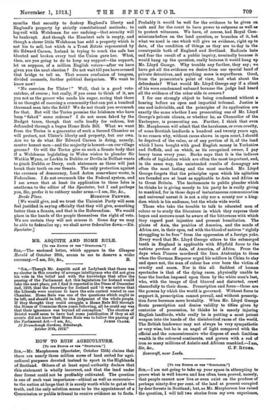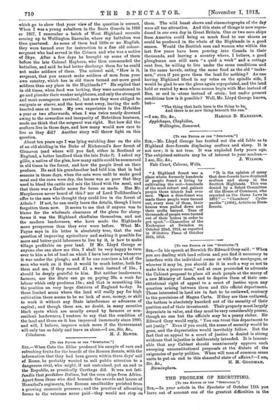[TO THE EDITOR Or THE "SPECTATOR:]
SIB,-I am not going to take up your space in attempting to prove what is well known and has often been proved, namely, that people cannot now live or even exist on the produce of perhaps ninety-five per cent, of the land at present occupied by deer forests in Scotland; but, as Mr. Macpherson has raised the question, I will tell two stories from ray own experience, which go to show that your view of the question is correct. When I was a young subaltern in the Scots Guards in 1866 or 1867, I remember a batch of West Highland recruits coming up to Wellington Barracks, where my battalion was then quartered. As some of them bad little or no English, they were turned over for instruction to a fine old colour- sergeant who had served in the Crimea and who was a native of Skye. After a few days he brought up some of them before the late Colonel Hepburn, who then commanded the battalion, and said be had better discharge them for he could not make soldiers of them. The colonel said, "How is it, sergeant, that you cannot make soldiers of men from your own country, which has in old times turned out more good soldiers than any place in the Highlands ?" He replied that in old times, when food was lacking, they were accustomed to go and plunder their weaker neighbours, and only the strongest and most courageous survived ; but now they were obliged to emigrate or starve, and the best went away, leaving the soft- hearted ones at home. My own experience in the Hebrides a year or two afterwards, when I was twice nearly drowned owing to the cowardice and incapacity of Hebridean boatmen, made me think that the sergeant was right. But how did the crofters live in those days, and how many would now care to live as they did? Another story will throw light on this question.
About ten years ago I was lying watching deer on the site of an old shieling in the Duke of Richmond's deer forest of Glenavon (and where will you find, either in Scotland or England, a better landlord than the late Duke ?). I asked my gillie, a native of the glen, how many cattle could be summered in old times in the forest, and how the people lived on their produce. He said his grandmother had told him that in bad seasons in those days, when the oats were unfit to make good meal and the cows were dry, the brose was so poor that they used to bleed the cattle and mix the blood with the meal, and that there was a Gaelic name for brose so made. Has Mr. Macpherson never heard of this ? nor of Lord Tullibardine's offer to the men who thought they could live in the forest of Athole ? If not, he can easily learn the details, though I have forgotten them now. It seems to me that if anyone was to blame for the wholesale clearance of the glens for sheep- farms it was the Highland chieftains themselves, and not the modern landowners, who have made the Highlands more prosperous than they ever were before. What Mr. Payne says in his letter is absolutely true, that the real question of improving agriculture and making it possible for more and better-paid labourers to live by it, is how to make tillage profitable on poor land. If Mr. Lloyd George or anyone else can show me this, I shall be very happy to turn over to him a lot of land on which I have lost money whenever it was under the plough; and if he can convince a lot of the men who work on it that it would be much better, both for them and me, if they earned £1 a week instead of 15s., I should be deeply grateful to him. But neither landowners, farmers, nor the State can go on paying 20s. a week for labour which only produces 15s.; and that is something like the position on very large districts of England to-day. In those limited areas where the land will really pay for high cultivation there seems to be no lack of men, money, or skill to work it without any State interference or advances of capital; and though there are, no doubt, in many counties black spots which are usually owned by farmers or non- resident landowners, I venture to say that the condition of the land and those on it has improved immensely since 1890, and will, I believe, improve much more if the Government will only tax us fairly and leave us alone.—I am, Sir, &c.,































































 Previous page
Previous page